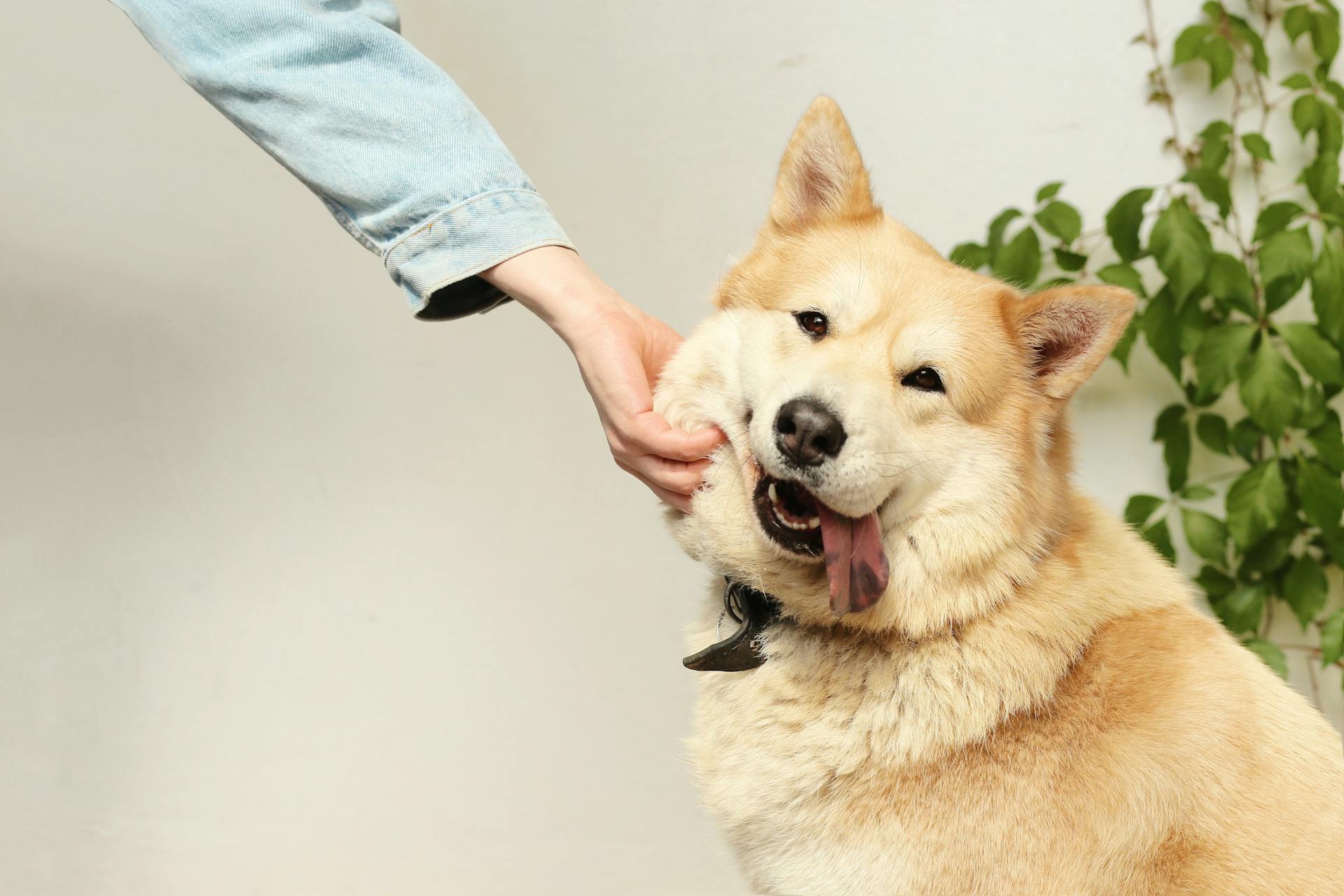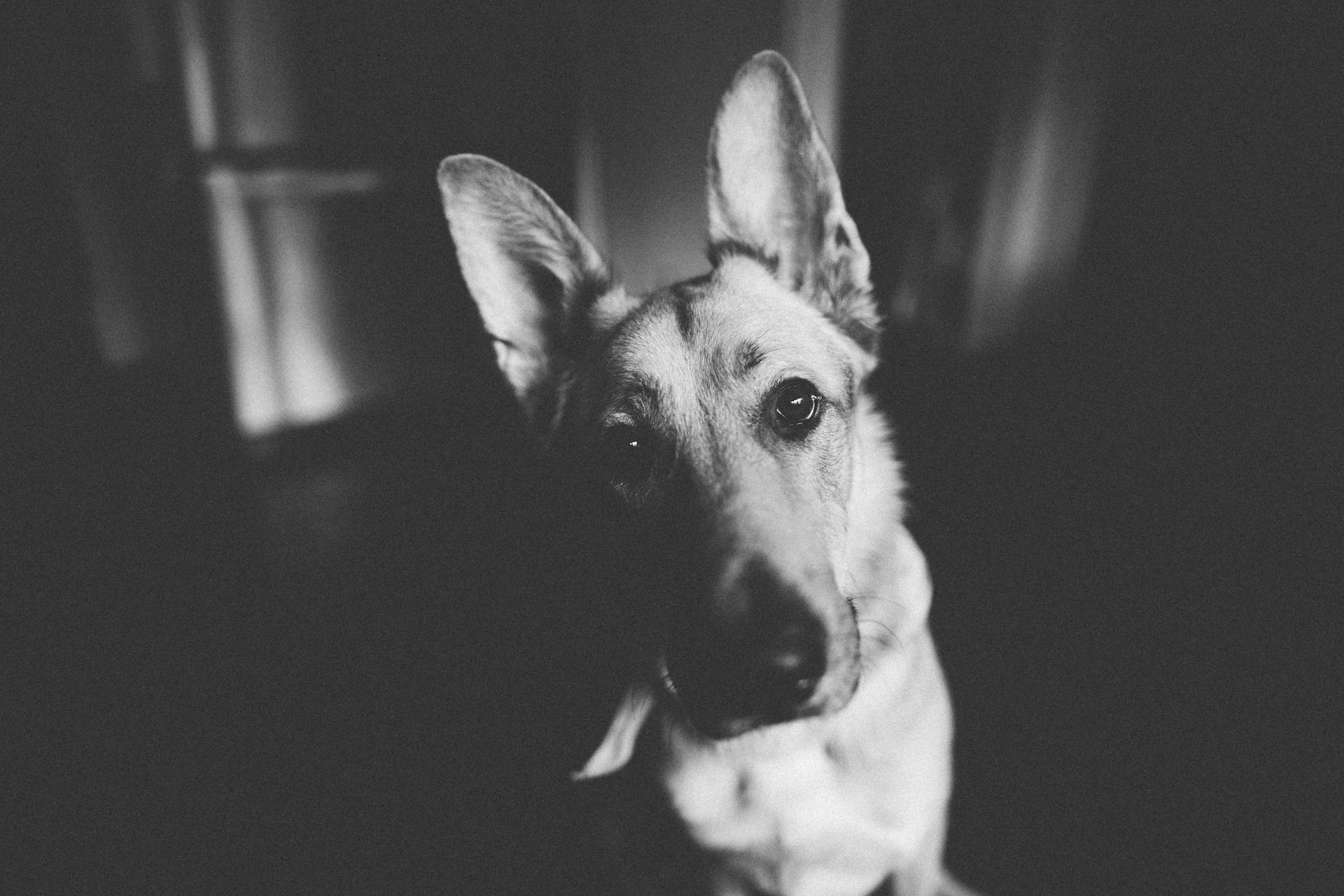
Mini Bernedoodle dogs are a cross between a Bernese Mountain Dog and a Miniature or Toy Poodle. They are a relatively new breed, but their popularity is growing rapidly.
Mini Bernedoodles are generally considered to be low-shedding dogs, making them a great option for people with allergies. They require regular grooming to prevent matting and tangling of their fur.
Mini Bernedoodles are known for their friendly and outgoing personalities. They are highly social and love to interact with their human family members.
In terms of size, Mini Bernedoodles typically weigh between 10-40 pounds and stand between 10-18 inches tall at the shoulder.
Characteristics
Mini Bernedoodle dogs are one of the most popular doodle breeds in the United States. They're also known as Mini Bernadoodle, Mini Bernese Poodle, and Mini Berniedoodle puppies.
Their fluffy coats are a mix between a Bernese Mountain dog and a Miniature Poodle, making them a hypoallergenic breed with minimal shedding.
For more insights, see: Miniature Toy Poodle Puppies
Mini Bernedoodles live longer, healthier lives due to hybrid vigor, which is a result of their mixed heritage.
These dogs are non-aggressive, well-mannered, friendly, and gentle, making them great with children of all ages, dogs, cats, other household pets, and even strangers.
They're highly intelligent, receptive, and easy to communicate with, which makes them very easy to train.
Mini Bernedoodles are kind, cheerful, and caring dogs, and they make excellent therapy dogs.
They're also highly adaptable, able to thrive in both small apartments and large houses, as well as in both active and calm lifestyles.
Here are some key characteristics of Mini Bernedoodle dogs:
- Miniature Bernedoodles are comfortable in both hot and cold climates.
- They're highly intelligent and receptive, making them easy to train.
- They're kind, cheerful, and caring dogs, making them excellent therapy dogs.
- They're highly adaptable and can thrive in various living situations.
Dog Care
Your mini Bernedoodle needs at least an hour of playtime each day, along with regular walks and time spent in a dog park or open area to run around.
Exercise is essential to keep them happy and prevent destructive behaviors out of boredom. Neglecting exercise needs can lead to a unhappy dog.
Make sure your mini Bernedoodle has their own space in your home with a bed and toys. Interactive toys are best for keeping them entertained while you're away.
Leaving your mini Bernedoodle alone for more than 6 to 8 hours at a time can make them lonely.
Regular vet visits are crucial to ensure your mini Bernedoodle stays in good health. Brushing your mini Bernedoodle twice a week is also necessary to prevent matting and tangling.
Mini Bernedoodles require one weekly brushing to avoid tangles and matting. They also need a few baths per year to keep them clean and shiny.
You should also check and care for your mini Bernedoodle's teeth, nails, and ears regularly, preferably once every few weeks.
Regular trims every 4 to 6 weeks can help prevent matting and make grooming easier. Costs for grooming vary based on location, your dog's size, and their behavior during sessions.
Readers also liked: Grooming a Bernedoodle
Behavior and Temperament
Mini Bernedoodles are easy-going, well-mannered, and highly trainable dogs with a joyful personality and a big heart. They are playful, always happy, and ready to play at a moment's notice.
Their temperament is a blend of their parent breeds, making them affectionate and eager to please. However, their high intelligence can sometimes translate to stubbornness, which may pose challenges during training.
Mini Bernedoodles are smart dogs that can pick up on things very fast, but they are sometimes too enthusiastic and can appear stubborn. They prefer to be cheered and motivated into learning, and a few delicious treats and positive reinforcement methods will keep them attentive and eager to learn.
Their attachment to family is strong, and they are prone to separation anxiety if left alone for too long. Early socialization and training can help prevent this, and it's recommended to leave them alone for short periods of time to adjust to some alone time.
Here are the different generations of Mini Bernedoodles:
Overall, Mini Bernedoodles are wonderful companions that thrive on love, attention, and activity. With proper training and socialization, they can become a beloved member of your family.
Temperament
The temperament of a Mini Bernedoodle is a unique blend of its parent breeds, making them wonderful companions. They are affectionate by nature and form strong bonds with their families.
Mini Bernedoodles are highly intelligent, inherited from the Poodle side, which ensures they are quick learners and keen observers. However, this intelligence can sometimes translate to stubbornness, which may pose challenges during training.
Their independent streak means consistent, positive training methods and patience are essential to harness their full potential. Early training is also needed to prevent bad habits from forming.
Mini Bernedoodles are generally easy-going, well-mannered, and highly trainable, making them a joy to be around. They are playful, always happy, and ready to play at a moment's notice.
In general, Mini Bernedoodles are good with children, as they can be gentle and fairly tolerant of loud noises. However, it's essential to teach your children how to properly interact with your Mini Bernedoodle to avoid any potential issues.
Take a look at this: Bernedoodle Potty Training
Here's a breakdown of the different types of Mini Bernedoodles:
Overall, Mini Bernedoodles are adaptable to any lifestyle, whether it's a busy family or a relaxed home. They are quick to form lifelong friendships and bonds, and their love is unconditional.
Exercise Needs
Mini Bernedoodles are moderately active dogs, enjoying outdoor activities like hiking and swimming, but also happy to laze around the house all day.
They prefer cuddling and relaxing on a couch over being active outdoors, but won't say no to a camping adventure. A 30-minute walk each day and some family playtime at home are enough to keep them happy, in shape, and healthy.
As they grow, adult Mini Bernedoodles need around 2 hours of exercise daily, which can include regular walks and playful time in a fenced-in yard.
Puppies might need additional playtime, but be careful not to make them overtired, as this can lead to bad behaviors like biting.
Despite their smaller size, Mini Bernedoodles are fairly energetic and need at least an hour of playtime each day combined with two to three lengthy walks.
Animal Interactions
The mini Bernedoodle is generally a friendly breed that gets along well with other animals, especially if they're introduced from a young age and grow up together.
Socialization is key to a smooth interaction between the mini Bernedoodle and other pets, including dogs and cats. They'll usually become great companions if they're properly socialized and introduced to each other in a controlled environment.
The mini Bernedoodle doesn't have a strong prey drive, but they might still chase small animals for fun, so it's essential to monitor interactions with prey animals.
Introducing the mini Bernedoodle to other pets requires patience and supervision to ensure the safety of both animals.
Health and Nutrition
Mini Bernedoodles are known for their excellent health, thanks to hybrid vigor, but they can still inherit health conditions from their parent breeds. They are generally predisposed to allergies, eye issues, and dental issues, but most live long and happy lives without serious health problems.
If this caught your attention, see: Bernedoodle Health Issues
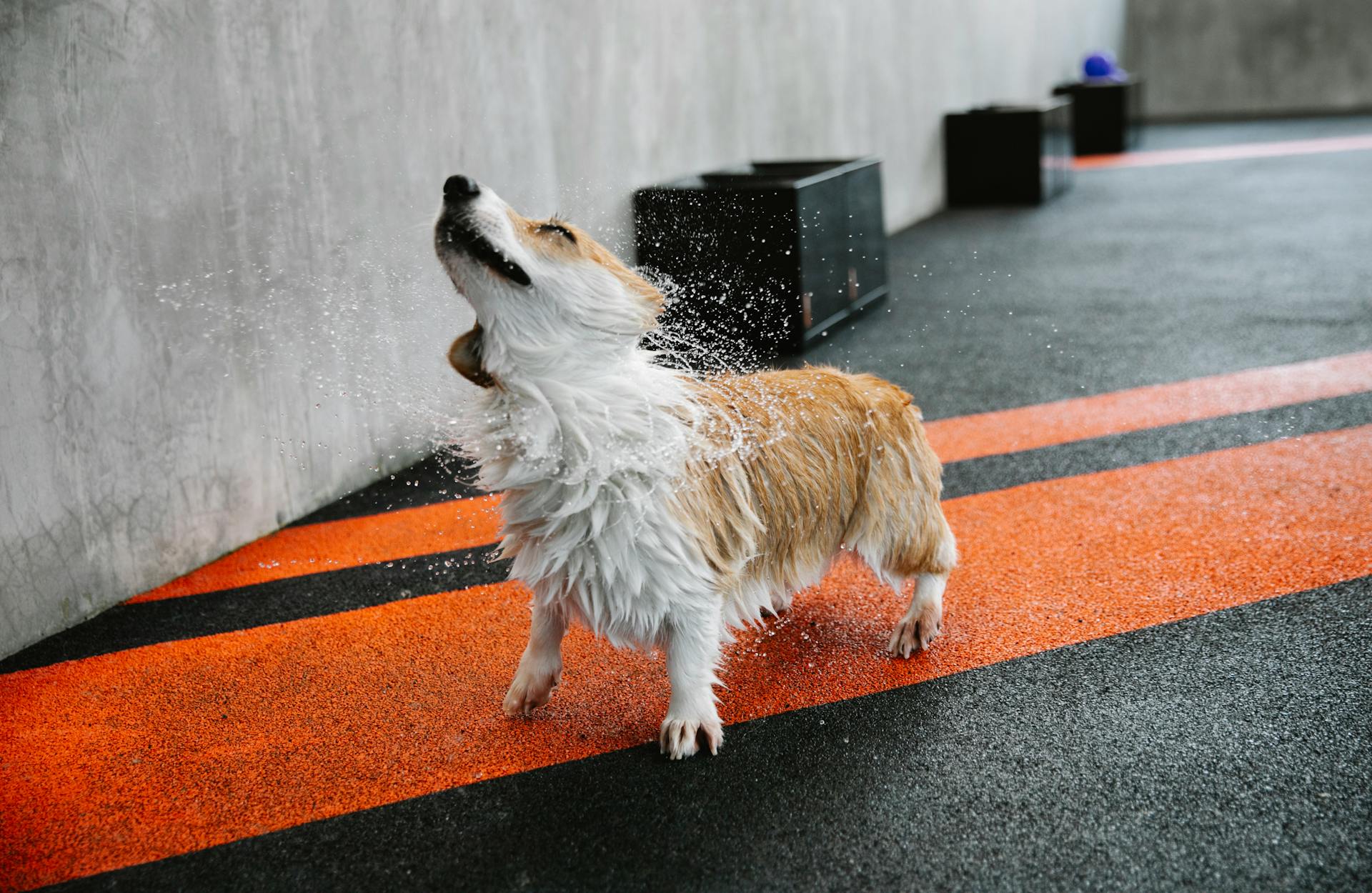
To keep your Mini Bernedoodle healthy, it's essential to provide them with regular exercise and a balanced diet. Feeding them age-appropriate dog food that doesn't exceed the recommended serving tailored to their weight is crucial. Some Mini Bernedoodles can become overweight if they don't get enough physical activity.
Here are some potential health issues to be aware of:
- Hip Dysplasia: a genetic condition where the thigh bone doesn't fit into the hip joint properly
- Elbow Dysplasia: a joint problem where abnormal development of the elbow joint can lead to pain and lameness
- Eye Conditions: including Progressive Retinal Atrophy (PRA), cataracts, and others
- Von Willebrand’s Disease: a genetic bleeding disorder
Regular veterinary check-ups, a balanced diet, and proper exercise can play a crucial role in ensuring a Mini Bernedoodle's overall health and well-being.
Dog Nutrition
Mini Bernedoodles are prone to becoming overweight if they don't get enough exercise, so it's essential to keep them active through daily walks and playtime.
To ensure your Mini Bernedoodle stays healthy, feed them age-appropriate dog food that doesn't exceed the recommended serving size for their weight. This will help prevent obesity and related health issues.
You should split your Mini Bernedoodle's meals into two to three portions per day, and the exact amount will depend on their energy level, the type of food, and their size. Consult with your vet to determine the best feeding schedule for your dog.
Some Mini Bernedoodles may develop allergies or skin issues, so it's crucial to monitor their diet and adjust it accordingly. A balanced diet and regular veterinary check-ups can help prevent or manage these conditions.
A high-quality diet of wet or dry food is best for Mini Bernedoodles, and it's recommended to feed them a mix of both types to ensure they get all the necessary nutrients.
Here are some general feeding guidelines for Mini Bernedoodles:
Remember to always consult with your vet to determine the best feeding plan for your Mini Bernedoodle, as their individual needs may vary.
Lifespan
Mini Bernedoodles have a lifespan of 12 to 18 years. To ensure your bundle of joy reaches or exceeds their life expectancy, make sure to give your dog plenty of exercise, high-quality dog food, and lots of loving cuddles.
Factors like genetics, health, diet, and care influence the typical life expectancy of a Mini Bernedoodle, which is 12 to 15 years.
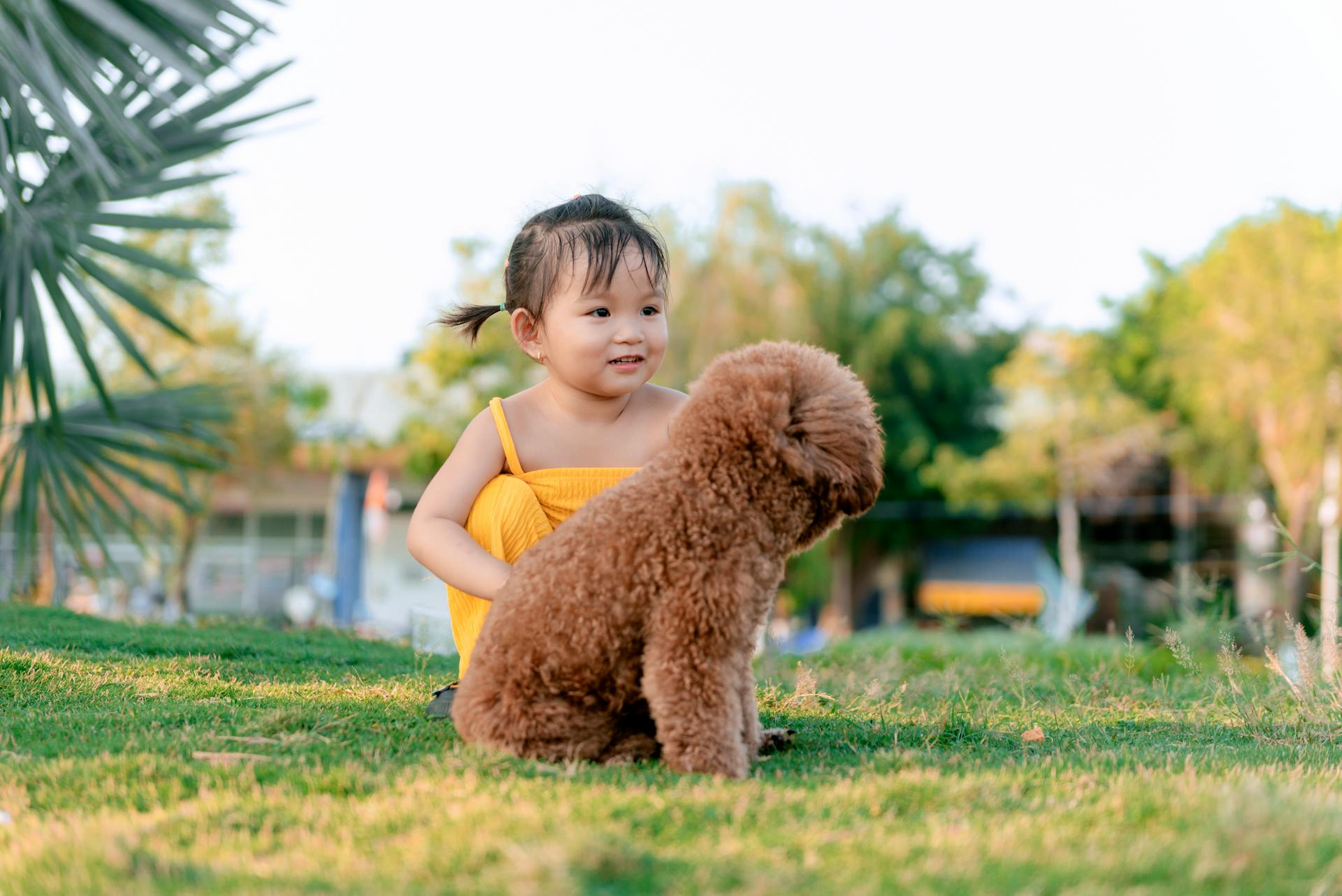
The longevity of Mini Bernedoodles can be attributed to its Mini Poodle parent, which averages a lifespan of 13 to 15 years, and in some cases, even reaches 18 years.
In contrast, the Bernese Mountain Dog tends to have a notably shorter lifespan, averaging just 6 to 10 years.
Providing a balanced diet and regular exercise can help your Mini Bernedoodle live a long and healthy life, reaching or exceeding their life expectancy of 12 to 18 years.
Here's an interesting read: Life Expectancy of Bernedoodle
Size and Variations
Mini Bernedoodles come in a range of sizes, making them a great fit for various living situations. Their weight can vary from 15 to 50 pounds, depending on the parent breeds used in the mix.
Some breeders offer Micro Mini or Toy Bernedoodles, bred using a toy poodle, which weigh between 15-45 pounds. These tiny dogs are perfect for apartment dwellers or those who want a small companion.
Mini Bernedoodles can also be classified into different size groups, such as F1, F1b, and F2, each with its own weight and height range. Here's a breakdown of the average weights and heights for each group:
Keep in mind that these are general estimates, and individual dogs may vary depending on their lineage and upbringing.
Size & Coat

Mini Bernedoodles come in a range of sizes, with some weighing as little as 20 pounds and others up to 40 pounds. Their coats are a beautiful, wavy/curly appearance and are hypoallergenic.
Their build is sturdy and well-proportioned, and their demeanor is calm and happy. They have sweet, rounded faces, oval-shaped eyes, and cute floppy ears.
Mini Bernedoodles can weigh anywhere from 20 to 50 pounds, depending on their generation. For example, F1 Mini Bernedoodles can range from 30 to 50 pounds, while F1b Mini Bernedoodles typically weigh between 20 and 30 pounds.
Their hair is semi to fully hypoallergenic with minimal to no shedding. Their coats can vary from straight to wavy or curly, depending on which parent they take after.
Here's a breakdown of the different sizes of Mini Bernedoodles:
- F1 Mini Bernedoodles: 30-50 pounds, 12-22 inches tall
- F1b Mini Bernedoodles: 20-30 pounds, 12-20 inches tall
- F2 Mini Bernedoodles: 25-35 pounds, 12-15 inches tall
- Smaller Mini Bernedoodles (Petite and Micro): less than 25 pounds, less than 12 inches tall
Their coats can vary in color, including combinations of black, white, and brown, as well as some gorgeous, uncommon colors like merle and blue merle.
Intriguing read: Blue Merle Bernedoodle Full Grown
Size Variation
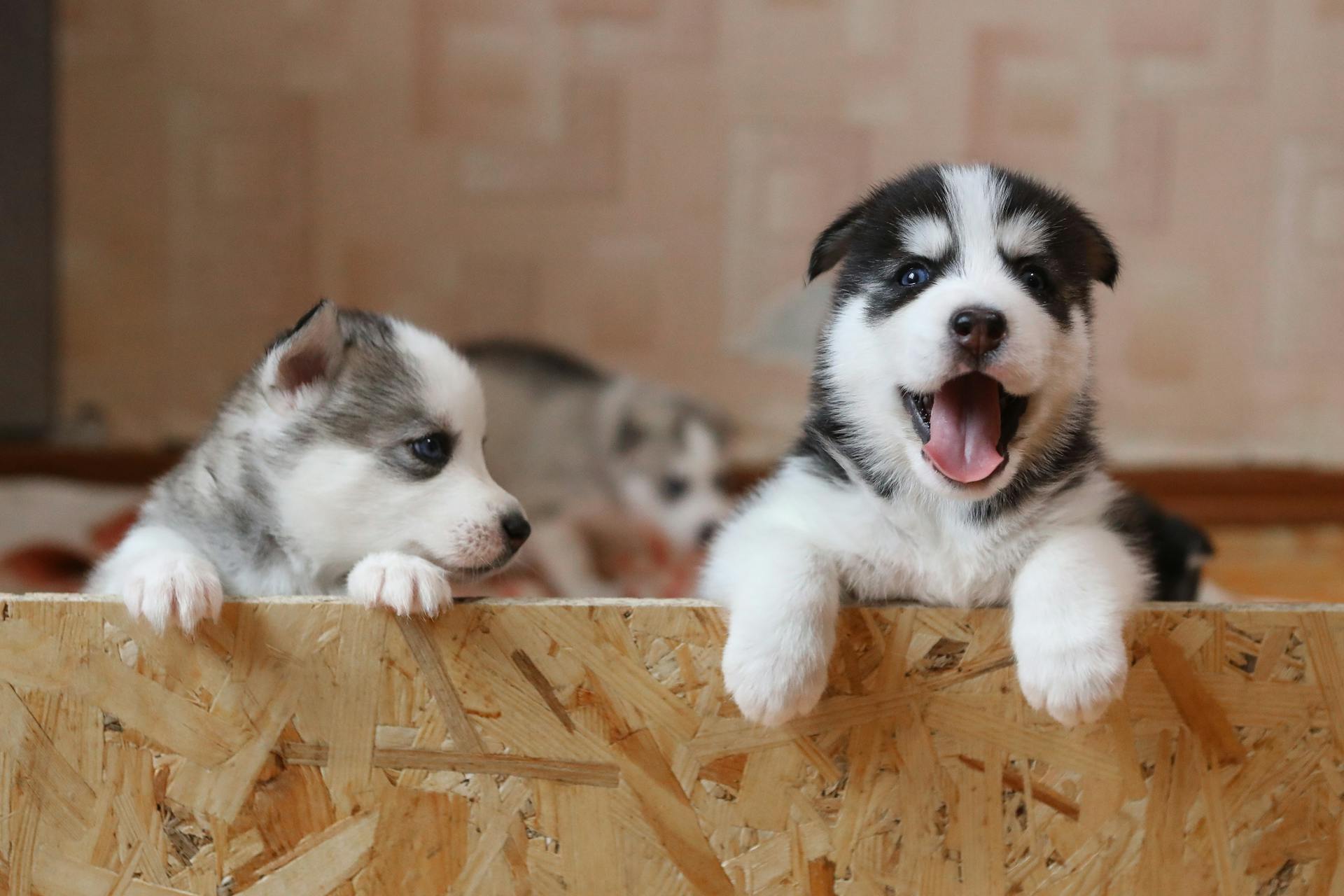
The size variation of Bernedoodles can be quite surprising, especially considering the significant size difference between their parent breeds. The Bernese Mountain Dog can weigh anywhere from 75 to 110 pounds, while the Miniature Poodle weighs a much smaller 10 to 15 pounds.
This size disparity makes predicting the offspring's exact size challenging, as mentioned in Example 5. The 20 to 50-pound range mentioned in Example 3 is indeed broad, and some breeders might use a moyen poodle or mini Australian Labraoodle in the mix, further affecting size outcomes.
Some breeders offer even smaller sizes, like the Micro mini or Toy Bernedoodle, which is bred using a toy poodle and weighs between 15-45 pounds, as noted in Example 1. This size class is the smallest among Bernedoodles.
Colors and Genetics
Mini Bernedoodles come in a variety of colors due to the diverse color genetics of both the Bernese Mountain Dog and the Poodle. This diversity is what makes them so unique and interesting.

Tri-color Mini Bernedoodles are one of the most recognized and desired colors, combining black, white, and rust or tan markings, mirroring the iconic Bernese Mountain Dog coloring.
Bi-color Mini Bernedoodles can be black and white, black and rust, or even chocolate and white, resembling a Bernese Mountain Dog but without one of the three colors.
Phantom Mini Bernedoodles showcase tan or white markings on a primarily black or chocolate coat, similar to the markings seen on Rottweilers or Dobermans.
Merle coat colors are uncommon in Bernedoodles and require careful breeding practices due to associated health concerns with the merle gene.
Solid-colored Mini Bernedoodles can occur, but they're less common and might be in shades of black, chocolate, or even cream.
Coat colors can be unpredictable, especially in mixed breeds, and the final adult color might vary from its puppy color as some colors fade or change with age.
Here are some of the most common colors and combinations found in Mini Bernedoodles:
- Tri-color: black, white, and rust or tan markings
- Bi-color: black and white, black and rust, or chocolate and white
- Phantom: tan or white markings on a primarily black or chocolate coat
- Merle: solid base color with patches of other colors scattered throughout
- Solid: black, chocolate, or cream
Ownership and Costs
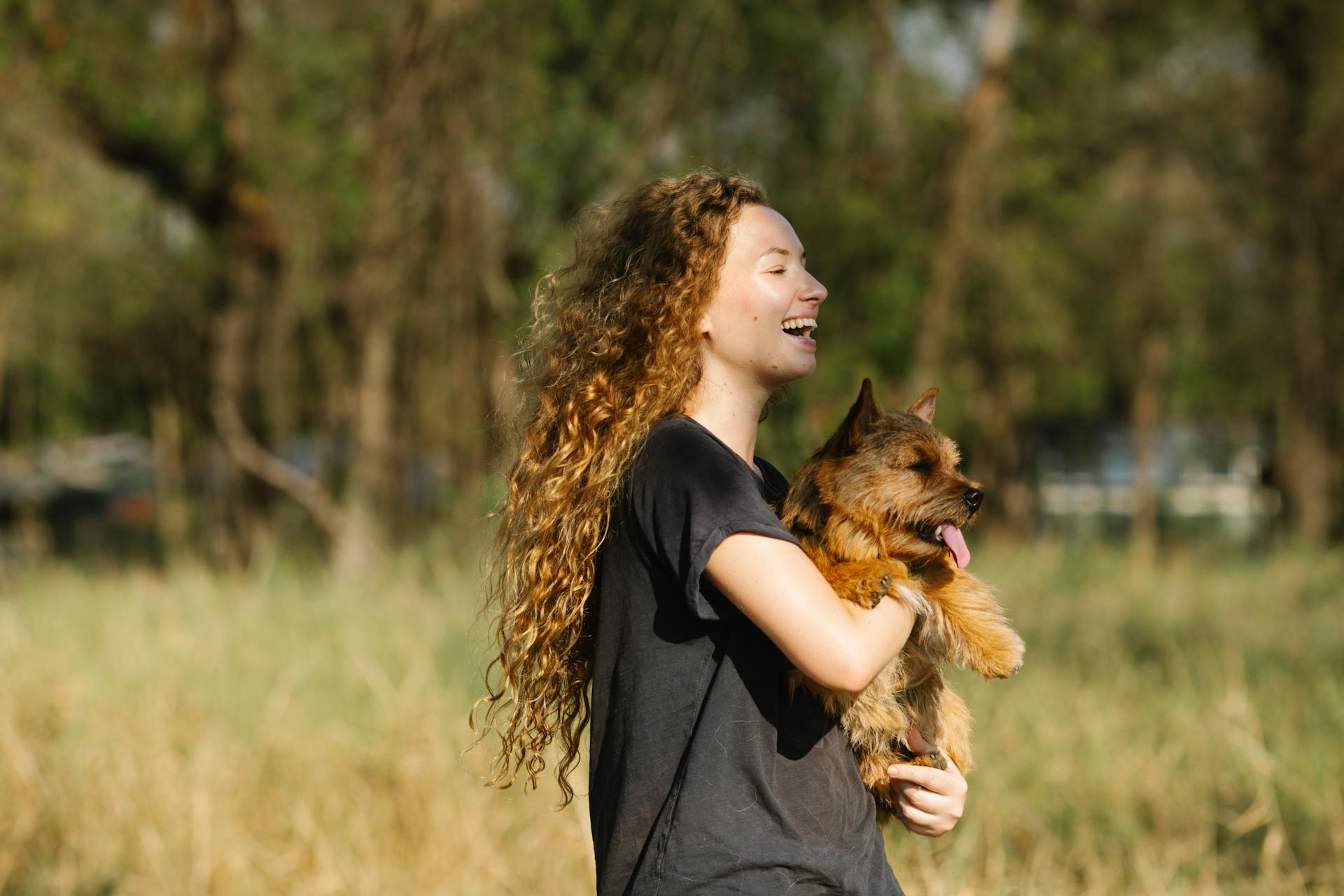
Owning a Mini Bernedoodle comes with some upfront costs, but it's essential to consider the long-term benefits.
The initial cost of a Mini Bernedoodle puppy can range from $2,500 to $5,000.
Reputable breeders prioritize health and early socialization, which may justify the higher price tag.
Cost Estimate
The cost of owning a Mini Bernedoodle can be a significant investment. On average, the initial cost of a puppy can range from $2,500 to $5,000.
Factors like breeder reputation, location, and coat type can greatly impact the price. Reputable breeders who prioritize health and early socialization typically charge more.
If you're looking to have your puppy trained before bringing it home, be prepared for a higher price tag of up to $15,000. This can be a good option if you want to skip the puppy blues.
It's essential to research breeders thoroughly to ensure they emphasize health and ethical breeding.
Check this out: How Much Does It Cost to Groom a Bernedoodle
Ownership and Costs
To get a Mini Bernedoodle, you'll need to consider the costs and wait times involved. Researching a reputable breeder is essential, as they should conduct health screenings and offer a health guarantee.
Check this out: Mini Bernedoodle Health Issues
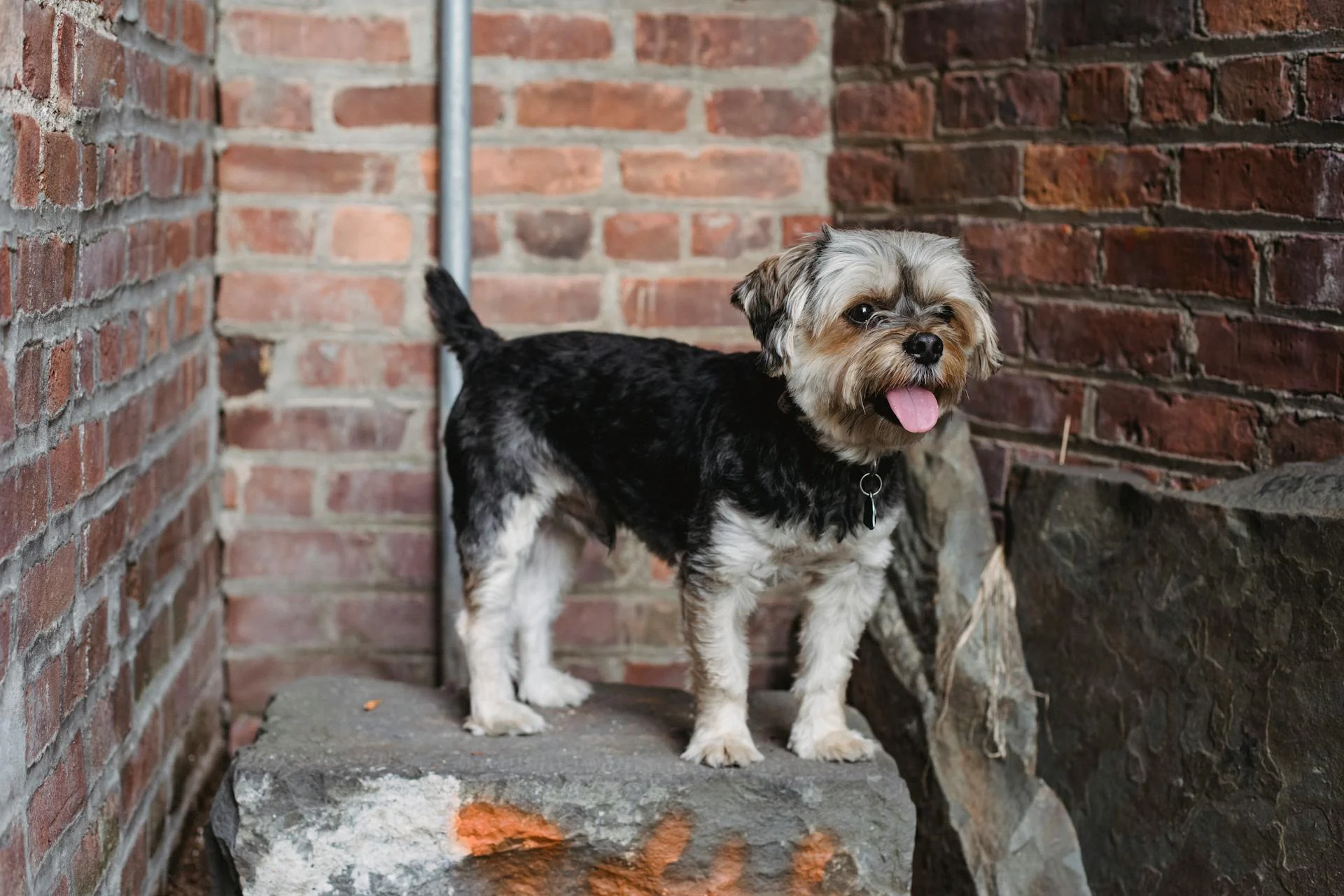
You can expect to pay anywhere from $250 to $600 to adopt an adult Mini Bernedoodle from a rescue organization or shelter, depending on the age of the dog and the adoption agency. The adoption fees for a young puppy may be higher.
If you're looking to buy from a breeder, be prepared to wait anywhere from 6 to 12 months for a puppy. If you want a Bernadoodle with tri-color markings, the wait can be even longer.
Here's a summary of the costs involved in getting a Mini Bernedoodle:
Choosing the Right Dog
If you're looking for a family dog, a mini Bernedoodle might be a great fit.
They are loving, affectionate, and outgoing, making them an excellent choice for families with children.
Their friendly nature also means they'll get along well with other animals in your household.
If you have an active lifestyle, a mini Bernedoodle is ready to join you on outdoor adventures rain or shine.
Their intelligence and loyalty make them a great companion for people who want a dog that's always by their side.
Broaden your view: Great Bernedoodle
Individual Stories

Meet Luna, a mini Bernedoodle who's been a beloved family member for five years. She's a perfect example of how these small dogs can bring so much joy and love into our lives.
Mini Bernedoodles are often described as " Velcro dogs" due to their strong attachment to their owners. This is because they were bred to be companion dogs, and their friendly nature makes them excellent family pets.
One of Luna's favorite things to do is play fetch in the backyard. She's extremely intelligent and can learn new tricks in no time, making her a great candidate for agility training or other dog sports.
Despite their small size, mini Bernedoodles are known for their high energy levels and require regular exercise to stay happy and healthy. This means daily walks and playtime are a must for these little bundles of joy.
Luna's owner noticed that she has a unique talent for sensing her owner's emotions and will often snuggle up close when they're feeling down. This is just one example of the strong bond that can form between a mini Bernedoodle and their owner.
Curious to learn more? Check out: Merrick Dog Food for Small Dogs
Multigen Puppies
We're excited to introduce you to our Multigen Mini Bernedoodle puppies, a true labor of love for us. We've worked tirelessly to improve the breed through genetic testing and careful selection of breeding parents.
These puppies are a result of careful breeding, with a focus on looks, temperament, genetic health, and more. Our goal is to provide the highest quality puppies available in the country.
Genetic testing is key to understanding what to expect from your puppy's coat and appearance. We can guarantee that our puppies will have the correct coat type, making them hypoallergenic and true Bernedoodles.
Keep in mind that hypoallergenic doesn't mean no shedding at all, but rather minimal shedding that's still allergy-friendly. We're transparent about this, and you can trust us to provide accurate information about our puppies.
Take a look at this: Mini Bernedoodle Hypoallergenic
Frequently Asked Questions
What are the negatives of mini bernedoodles?
Mini Bernedoodles may be prone to inherited health issues such as hip dysplasia, elbow dysplasia, and eye problems due to their hybrid breed nature. Responsible breeding practices can help minimize these risks, but it's essential to research and understand the potential health implications.
Do mini Bernedoodle bark a lot?
Mini Bernedoodles are generally quiet dogs, with minimal barking. However, they still require regular exercise and mental stimulation to thrive in any living situation.
Featured Images: pexels.com
